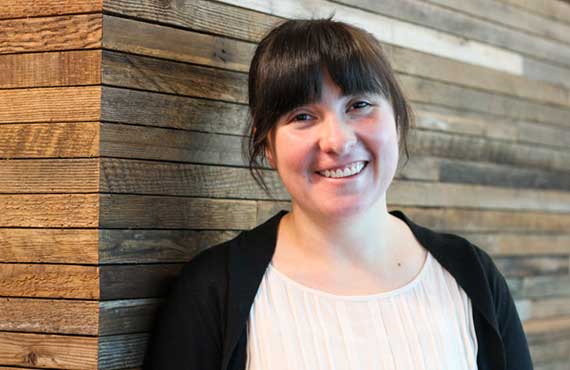Khoury News
Classroom Q&A: Dr. Tamara Bonaci on Science Fiction and Computer Science
During this year’s Winter intersession at Northeastern, students had an opportunity to explore and discuss connections between science fiction and computer science with Dr. Tamara Bonaci, Khoury College assistant teaching […]

During this year’s Winter intersession at Northeastern, students had an opportunity to explore and discuss connections between science fiction and computer science with Dr. Tamara Bonaci, Khoury College assistant teaching professsor. In a recent interview, Bonaci spoke to Khoury News about teaching in Seattle, her motivation to pursue security and privacy, and her enthusiasm for sci-fi and art.
Tell us about your background, academic and professional.
I moved to the U.S. more than a decade ago from Croatia, where I got my undergraduate degree. Around that time, my focus was on systems, controls, and robotics. I got my PhD from the University of Washington, and I joined UW to do mathematical modeling of security threats against wireless sensor networks. From there, I fell in love with security and privacy, and I’ve been doing security research ever since.
What’s the current focus of your work?
I’m really interested in privacy issues around emerging technologies. One of the reasons why has to do with the fact that, if something isn’t already widely used and ubiquitous, then maybe by taking this forward-looking approach we actually might be able to do something to change things for the better.
Both in research and in the classroom, I occasionally allude to societal implications of technology because the more technology gets integrated into our everyday life, the more we see the beautiful, the good, and the bad, but also the ugly of it. The more I am involved in this space, the more I’m aware that technology doesn’t mean to live in a vacuum–it affects our lives in all sorts of amazing and also horrible ways.
Tell us about your intersession class, what were you covering?
We spoke a lot about popular science fiction references, everything from Star Wars, to Star Trek, to The Matrix, Ex Machina, and Black Mirror. The students taught me so much more than I ever knew about science fiction. We also read some good stories. We examined some of the fundamental sci-fi works like Neuromancer and Snow Crash, and then spent a good chunk of time in the classroom thinking about what does that sci-fi mean for us? We also gave good attention to some of the recent Cory Doctorow stories. That allowed us to ask what does sci-fi teach us about privacy. What happens with privacy, fairness, and access when algorithms are making decisions about us, based upon our online behavior?
Why did you choose this topic?
So, my overarching motivation for this course came from two questions: How do we develop a notion that technology doesn’t live in vacuum? How do we develop our ‘Spidey senses’ about the good and the bad of technology? There was another motivation as well–I moved to the U.S. as an international student, and I was very fortunate to be a part of amazingly kind and friendly labs and to have amazing collaborators. However, I was missing many pop-culture references and sci-fi when I moved here. So people would mention things that everyone born here knew; it was common knowledge. But I didn’t recognize them…, Eventually you pick it all up, you know–you read, you watch TV, you interact with your peers… But I figured, oh, gosh, what would I have given to take a course where I could just pick these things up?
What stood out about the topic to you, and why is it important for students to learn about it?
When we’re teaching and empowering the next generation of computer scientists, software engineers, and people focused on technology in some way, we want to make them aware that the technology has impact on people’s lives, both good and bad. We want to make them aware of potential dangers. So, I was thinking for a while now, what would be a good way to convey the possibilities of technology, in a way where I’m not just talking at my students? It seemed to me that science fiction might be exactly the way to go because it allows us to think about all these super cool technologies that we don’t have yet–or maybe are just about to have. If we talk a little bit about these sci-fi stories, and then we ask some pointed questions–that seemed like a good way to develop these critical skills.
What else do you teach for Khoury College, at what level?
As a teaching assistant professor on our Seattle campus, I teach a couple of Align courses. I teach CS 5002: Discrete and Data Structures as well as CS 5004: Object-Oriented Design. In addition, I have a sequence of security and privacy graduate-level courses that I teach, including CY 5770: Software Vulnerabilities and Security and CS 6770: Introduction to Privacy Engineering.
Besides your work at Khoury, what else do you do professionally?
The beautiful thing about teaching security and privacy courses is that, even though my teaching schedule is pretty busy, I do get to think about and research interesting security and privacy-focused questions. I try to stay as research active as I possibly can. The way I go about it is that I try to recognize opportunities and interesting topics and examine them in collaboration with our amazing students. The silver lining of looking at emerging technologies is there’s a lot of them! If you have a good student team, or people who are willing to collaborate with you, it’s possible to make a change.
At the moment, I’m involved in several research projects, and we are currently working on a project focusing on the question: “How have people’s attitude towards fitness activity trackers changed in the face of COVID-19?” Even though gyms are shut down, many people still want to continue exercising and being healthy, and they may have switched to the virtual world. To what extent has that changed their awareness of possible privacy issues? What are the implications of that change? There’s another project where we’re inspired by the COVID-19 situation around us. This past summer, things had gotten pretty interesting in terms of finding co-ops or internships, and what my student team and I observed was that, all of a sudden, there seemed to have been a whole lot more solicitations on professional social networks that seem suspicious or fishy. We decided to investigate whether that is actually the case, or if it was just our perception.
What topics in computer science interest you? Do you have any specific problems or applications that you’re particularly passionate about?
My biggest personal and professional focus is on privacy engineering. Coming from a technical background, but also having spent a lot of time working in interdisciplinary research labs, I think that we will not be able to resolve all privacy issues solely through technology. It has to be a combination of technical solutions, policy and regulation, as well as education. That said, there are many things that can be improved just by having well-developed technical solutions. At the moment, I’m very interested in how the use of cryptography can improve privacy.
What’s it like teaching at the Seattle campus and living in the Seattle area?
It’s pretty amazing. You know, as a transplant to the area, you hear all these things about Seattle, how it always rains, how it’s grey and gloomy many months of the year, and so on. Something that people don’t talk about is that people don’t really leave Seattle–you move here, and you move for good. It’s an amazing city: very open-minded, lots of different cultures, lots of different perspectives, a bunch of amazing people from all over the world to interact with. We get a lot of amazing students from all over the U.S., but also from all over the world. They are very hardworking, very highly motivated, very driven, so it’s been a real pleasure to work with them and to learn from them. Every single time I get to hear about our students’ background and experiences, I kind of have to pinch myself and think, “Oh, wow, how did I get to be in the classroom with these amazing people?” We’re growing pretty steadily, in terms of our student population, space, and faculty. I am really lucky to be here.
What’s a fun fact about you, that your students might not know?
This pandemic has been really hard on all of us. It’s difficult to wrap our heads around the hardships that all of us have faced. At some point, I picked up painting–really, I’m not that artistic. But it was a way to remove myself from screens and the negative news cycles. At some point, I listed online some of these paintings that I made. I just wanted to see if someone else would think it was cool, and someone else thought that it was cool. That kind of made my day.

Image: “Purple Play” by T. Bonaci